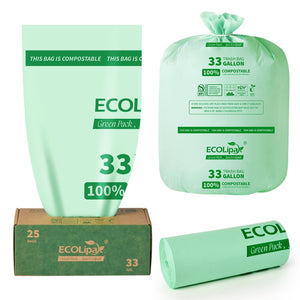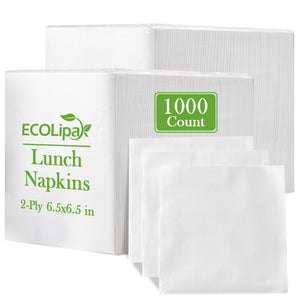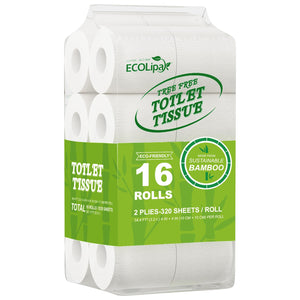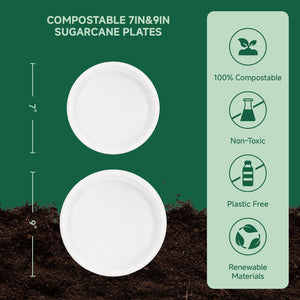You want your kitchen to make a positive impact on the environment, right? Switching to biodegradable garbage bags 13 gallon can help you do just that. Certified compostable bags, like those from Ecolipak, break down naturally and support a greener lifestyle. When you pick certified compostable, biodegradable garbage bags, you choose eco-friendly products that reduce single-use plastics. These biodegradable solutions protect the environment and keep your home healthy.
Choose certified compostable biodegradable garbage bags for your eco-friendly kitchen and see how small changes create a big difference.
Key Takeaways
Switch to certified compostable biodegradable garbage bags to reduce plastic waste and support a healthier environment.
Store biodegradable bags in a cool, dry place to maintain their strength and effectiveness until use.
Fill compostable bags only two-thirds full to prevent leaks and ensure proper composting.
Compost bags at a local facility or backyard pile to maximize their environmental benefits and create rich soil.
Choose Ecolipak bags for their durability and odor control, making kitchen waste management easier and cleaner.
Choosing Biodegradable Garbage Bags 13 Gallon
What Makes Bags Biodegradable
When you look for biodegradable garbage bags 13 gallon, you want to make sure they are truly compostable. Not all biodegradable trash bags break down the same way. Some bags only degrade in special conditions, while others work in your home compost. The key is to check for certifications. These show you that the bags meet strict standards for compostable materials and will break down safely.
Here’s a quick look at the most important certifications for compostable trash bags:
Certification |
Description |
|---|---|
BPI |
Certified compostable (ASTM D6400) |
TÜV AUSTRIA |
OK Compost certification for home and industrial composting |
DIN CERTCO |
Certified according to EN13432 standard |
When you choose bags with these labels, you know you’re getting compostable, eco-friendly products that help protect your family and the planet.
Compostable trash bags do more than just hold your kitchen waste. They help phase out single-use plastics and support the use of reusable alternatives. You can even use some biodegradable trash bags more than once before composting them. These bags also help reduce methane emissions from landfills and leave no harmful residues. Instead, they turn into water, CO2, and humus, which is great for your garden.
Ecolipak Compostable Trash Bags Features
Ecolipak stands out as a trusted brand for compostable trash bags. You get bags made from strong, corn-based compostable materials. They are certified compostable and meet top environmental standards. Ecolipak bags are known for their durability and leak resistance, even when you use them outdoors. This makes them a great choice for busy kitchens and families who care about eco-friendly living.
Here’s what you’ll love about Ecolipak biodegradable trash bags:
Tear-resistant and durable, so you don’t have to worry about leaks.
Made from compostable, BPA-free materials that are safe for your home.
Fit standard kitchen bins, making them easy to use every day.
Control odors, keeping your kitchen fresh.
Break down completely in compost, leaving no trace behind.
When you pick Ecolipak, you choose biodegradable plastics that support a cleaner, greener world. You help your family live healthier and inspire others to make eco-friendly choices, too.
Using Compostable Trash Bags Effectively
Bag Placement and Handling
You want your eco kitchen to run smoothly, so using compostable trash bags the right way matters. Start by storing your biodegradable trash bags in a cool, dry spot. Heat or humidity can cause them to break down too soon, making them harder to handle. Keep your bags away from direct sunlight and avoid leaving them in warm places like under the sink near the dishwasher.
When you line your bin, make sure the bag fits snugly but not too tight. If you want extra leak protection, try lining the bottom of your bin with a sheet of newspaper. This helps keep the bag dry and stops liquids from pooling at the bottom. Always empty any liquids from food scraps before tossing them in. This simple step keeps your compostable trash bags strong and leak-free.
Ecolipak biodegradable trash bags come with a star seal at the bottom. This design helps prevent leaks and makes it easy to lift the bag out of the bin without spills. You get a cleaner kitchen and a smoother composting process.
Tip: Store your compostable trash bags in their original box or a sealed container to keep them fresh and ready for use.
Suitable Kitchen Waste Types
Not all kitchen waste belongs in compostable trash bags. You want to fill your bags with the right materials to get the best results. Compostable trash bags work best with fruit and vegetable peels, coffee grounds, eggshells, tea bags, and other plant-based scraps. These items break down quickly and help create rich compost.
Avoid putting meat, dairy, or oily foods in your compostable trash bags unless your local composting program accepts them. These items can slow down the composting process and attract pests. Also, skip anything that is not compostable, like plastic wrappers, rubber bands, or metal. These materials do not break down and can ruin your compost.
Here’s a quick guide for what to toss in your biodegradable garbage bags 13 gallon:
Compostable Kitchen Waste |
Not Compostable |
|---|---|
Fruit & veggie scraps |
Plastic bags |
Coffee grounds & filters |
Metal |
Eggshells |
Glass |
Tea bags (paper) |
Rubber bands |
Bread & grains |
Foil |
By sticking to compostable items, you help your biodegradable trash bags do their job and keep your compost clean.
Avoiding Overfilling and Mixing
You might feel tempted to stuff your compostable trash bags to the brim, but overfilling leads to trouble. When you pack too much into one bag, you risk leaks and tears. The seams can stretch and break, especially if you add wet or heavy scraps. To avoid this, fill your bag only up to about two-thirds full. If you have a lot of kitchen waste, use a second bag instead of forcing everything into one.
Wet scraps can be tricky. Drain off any extra liquid before tossing them in. For really heavy or wet loads, double-bagging gives you extra protection and peace of mind.
Mixing non-compostable items with your compostable trash bags causes big problems. Plastics, glass, and metals do not break down. They contaminate your compost and can harm the environment. When you keep your biodegradable trash bags free from non-compostable waste, you protect the quality of your compost and help the planet.
Note: Always check your local composting guidelines. Some programs accept more items than others, so knowing the rules helps you make the most of your eco-friendly efforts.
Using compostable trash bags the right way keeps your kitchen clean, your compost healthy, and your eco-friendly goals on track. You make a real difference every time you choose biodegradable solutions and use them with care.
Maximizing Environmental Impact
Disposal Tips for Biodegradable Trash Bags
You want your eco kitchen to make a real difference, so knowing how to dispose of compostable trash bags the right way is key. If you toss these bags in the regular trash, they might end up in a landfill, where they break down very slowly. Landfills don’t have enough air or the right microbes for compostable materials to decompose quickly. That means your biodegradable trash bags could stick around for years, just like regular plastic.
To get the most out of your compostable trash bags, follow these tips:
Make sure your bag fits snugly in your kitchen bin. This helps prevent leaks and keeps things tidy.
Place a layer of paper towels or newspaper at the bottom of the bag. This absorbs extra moisture and keeps your compostable bag strong.
Always keep compostable waste separate from recyclables. Mixing them can ruin both the compost and the recycling.
When your bag is full, take it to a local composting facility. These places have the right conditions for compostable bags to break down fast and turn into healthy soil.
If you have a backyard compost pile, you can use it for your compostable trash bags. Just make sure your pile gets warm enough for the bags to decompose.
Tip: Never put compostable trash bags in the recycling bin. They don’t belong there and can cause problems at recycling centers.
When you follow these tips, you help your compostable trash bags do their job. You keep waste out of landfills and help create rich compost that improves the soil in gardens and parks. You also lower your carbon footprint because biodegradable bags use less energy to make and break down faster than regular plastic.
Composting with Ecolipak Bags
You might wonder how Ecolipak compostable trash bags fit into your composting routine. These bags are designed for both home and industrial composting, so you have options. If you use a home compost pile, you’ll notice that compostable bags like Ecolipak break down over several months. The process depends on how hot your pile gets and how much you turn it. In a backyard compost, these bags usually decompose within a year, especially if you add decomposing agents and keep the pile moist and warm.
Here are some tips for composting with Ecolipak bags at home:
Tear the bag into smaller pieces before adding it to your compost pile. This helps it break down faster.
Mix the bag pieces with other compostable kitchen scraps like fruit peels, coffee grounds, and eggshells.
Keep your compost pile moist but not soggy. Turn it every week to add air and speed up decomposition.
Watch for the bag to disappear over time. In most home compost piles, Ecolipak bags break down within 365 days.
If you have access to an industrial composting facility, you can drop off your filled Ecolipak bags there. These facilities keep the temperature high and use special microbes to break down compostable materials quickly. In this setting, your bags can turn into healthy soil in just a few weeks or months.
Tip: Compostable trash bags work best when you fill them with plant-based scraps. Avoid putting in plastic, glass, or metal, since these won’t break down and can harm your compost.
Using compostable trash bags like Ecolipak helps you protect the environment. These bags are made from renewable resources, so they use less fossil fuel. They break down cleanly and quickly, which means less pollution in landfills and healthier soil for everyone. When you choose eco-friendly, compostable products, you support a cleaner planet and set a great example for your family.
You can see the difference in your own backyard. Composting with biodegradable bags turns kitchen waste into rich soil that helps your garden grow. You reduce waste, lower greenhouse gases, and keep your home healthy. Every small step adds up, and your choices matter.
Tip: Check with your local composting program to see what types of compostable trash bags they accept. Some programs have special rules, so it’s always good to ask.
By following these tips, you make sure your compostable trash bags have the biggest impact. You help turn waste into something good for the soil and the environment. You show your family and friends how easy it is to live a greener life.
Overcoming Common Challenges
Odor and Durability Solutions
You might worry that compostable or biodegradable trash bags can’t handle your kitchen waste or keep odors in check. The good news? Ecolipak bags are designed to tackle both problems. These bags use strong, renewable materials like cornstarch, so they stay sturdy even when you toss in heavy or wet scraps. You don’t have to stress about leaks or tears during your daily kitchen routine.
Here’s a quick look at what makes these bags reliable:
Feature |
Description |
|---|---|
Strong & Durable |
Handles kitchen waste without breaking. |
Tear & Leak Resistant |
Prevents spills and messes, even with wet scraps. |
Odor Control |
Neutralizes unpleasant smells, keeping your kitchen fresh. |
Usage Frequency |
Change bags every 3-4 days for best results. |
Breakdown Properties |
Bags break down faster in heat and humidity, so use them within a year. |
If you want to keep your kitchen smelling clean, empty liquids from food scraps before tossing them in. Change your compostable bag every few days, especially in warm weather. This simple habit keeps odors away and helps your eco-friendly kitchen run smoothly.
Tip: Don’t overfill your bag. Leaving some space at the top makes it easier to tie up and carry out, reducing the risk of spills.
Storing Compostable Trash Bags
Proper storage keeps your biodegradable and compostable bags strong until you need them. Heat and humidity can cause these bags to start breaking down early, so you want to store them right.
Follow these easy steps:
Keep unused bags in a cool, dry place like a cupboard or pantry.
Avoid direct sunlight and moisture, which can shorten shelf life.
Store bags in their original box or a sealed container.
Don’t overload bags when using them—this helps maintain their integrity.
Compostable bags need special care because they react to their environment. If you store them well, you get the best performance and help your kitchen stay eco-friendly. Remember, these bags are made to break down, so use them within a year for top results.
Note: Many people think biodegradable bags break down anywhere, but they need the right conditions—like those in compost piles or facilities—to decompose fully.
Real-Life Eco Kitchen Stories
Case Studies
You might wonder how switching to biodegradable trash bags can make a real difference. Across the country, families and communities have seen big changes by choosing biodegradable options for their kitchens. Here are some inspiring examples:
Community engagement programs have helped people learn about the benefits of composting and using biodegradable bags. These efforts have led to less plastic waste in neighborhoods.
Cities like Nashville, Denver, and New York City have studied food waste and found that using biodegradable bags helps manage kitchen scraps better. These cities now have more efficient waste systems.
Some places use a cart-tagging program. This program encourages you and your neighbors to use compostable bags for organic waste. It has become a successful way to cut down on landfill waste and support composting.
When you join these efforts, you help your city become cleaner and greener. You also show your family how easy it is to make eco-friendly choices every day.
User Testimonials
You are not alone in your journey toward a greener kitchen. Many people have shared their experiences with Ecolipak Compostable Trash Bags:
"These bags feel durable and handle heavy waste, like a week's worth of kitchen trash and even cat litter, without breaking."
"The drawstring kitchen bags are some of the sturdiest I’ve tried. They keep odors away and are perfect for home composting."
"I appreciate the sturdiness of these bags. They make managing kitchen waste so much easier."
You can see that real users trust Ecolipak for their biodegradable needs. The bags help you keep your kitchen clean, control odors, and make composting simple. When you choose biodegradable products, you join a growing group of families who care about the planet. Your small steps inspire others to live healthier and more eco-friendly lives.
You can make your eco kitchen shine by following a few simple steps with biodegradable garbage bags 13 gallon:
Store your bags in a cool, dry spot to keep them fresh.
Use each bag within three days if it holds organic waste.
Compost the bags in a standard pile for quick breakdown.
Switching to Ecolipak Compostable Trash Bags means you cut plastic waste and help the planet. These biodegradable trash bags break down safely, leaving no toxins behind. Every time you choose biodegradable, you protect your family’s health and inspire others to join the green movement. 🌱
FAQ
How long do Ecolipak compostable trash bags take to break down?
You can expect Ecolipak bags to decompose in 3–6 months under composting conditions. They break down faster in warm, moist environments, turning into water, carbon dioxide, and natural materials.
Can I use these bags for yard waste or just kitchen scraps?
You can use Ecolipak compostable bags for both kitchen scraps and yard waste. They handle leaves, grass, and food peels with ease. Just avoid sharp branches or heavy rocks.
Are Ecolipak bags safe for my family and pets?
Yes! Ecolipak bags are BPA-free and made from plant-based materials. They contain no harmful chemicals, so you can feel good about using them around your loved ones.
Do these bags fit all standard kitchen bins?
Ecolipak 13-gallon bags fit most standard kitchen bins, including popular brands like SimpleHuman. You get a snug fit that keeps your bin clean and tidy.
What should I avoid putting in compostable trash bags?
Skip plastics, glass, metal, and greasy foods. Stick with fruit peels, coffee grounds, and other plant-based scraps. This keeps your compost healthy and helps the bags break down quickly.









